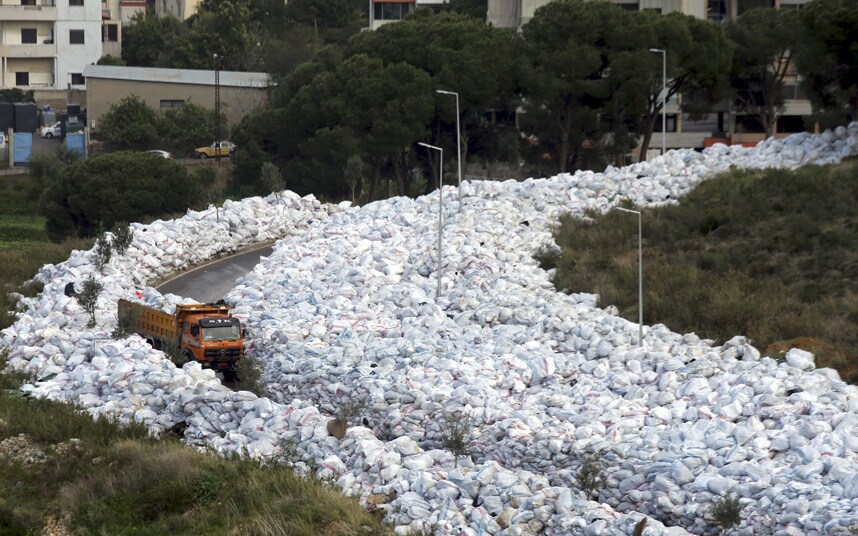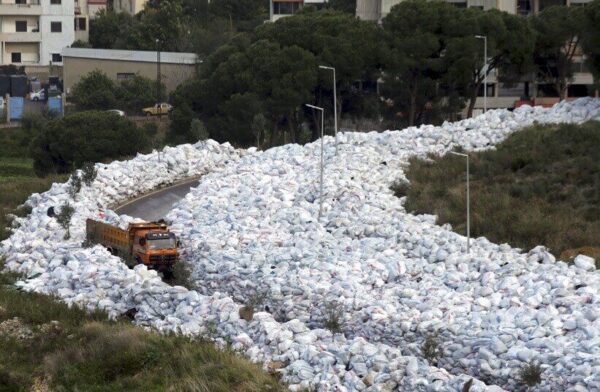By MONA DEELY

Across Lebanese neighbourhoods, uncollected garbage piled up steadily, rotting in the blazing heat, and stinking the place down. In fact, pollution from trash fires and waste chucking in the Mediterranean was spilling over the country’s borders.
What sounds like a dystopian sci-fi was Beirut in 2015 after an overflowing landfill closed without an alternative site in place. The fumes from the site were so pungent that they forced residents to shut their windows. Years later those very windows were blown to smithereens because of the Beirut port explosion.
Both events were man-made disasters, a product of negligence and corruption in the country.
Lebanon is in dire need of international support to tackle these challenges. But until necessary steps are taken to address rampant corruption in Lebanon, international funders risk feeding the rotten system that has pushed the state to the precipice.
After 15 years of civil war, Lebanon worked hard to get back on its feet. The historic downtown of Beirut was luxuriously redeveloped, the country’s social and cultural scenes were buzzing, and the spirit of entrepreneurialism was strong. But the return to prosperity was precarious due to the country’s sectarian politics and its entrenched corruption.
War in Syria brought further challenges as Lebanon hosted the largest and most concentrated number of refugees in the world.
However, the country’s woes cannot be blamed on regional instability alone. It’s the sheer mismanagement of the economy that has resulted in spiralling unemployment, food and medicine shortages and a currency crisis so acute that some ordinary citizens had to resort to raiding banks to recover their deposits.
As the economic situation became dire, power outages became frequent. Standards of state provision of electricity, water and sustainable waste management were never high and took a further hit. Those who could afford it relied on privately-sourced generators and water tanks. But such personal initiatives cannot work for waste management and rubbish started piling up in neighborhoods.
Seeing the pitiful state of affairs, the EU came to the rescue. It led the support for the waste management sector in Lebanon by spending around €89m between 2004-2017, with at least €30m spent on 16 solid-waste management facilities. This was a much-needed intervention to address the grave health and environmental implications.
However, it failed to deliver.
Reform Initiative for Transparent Economies (RITE) looked into the matter to see why it failed to deliver. It found that the implementation of the EU support was entrusted to the governmental organisation OMSAR (Office of the Minister of State for Administrative Reforms) with provision for expert involvement.
Badly-designed and insufficient monitoring
However, the result was poor facilities and outcomes, sporadic operations and premature closures. In addition, the mismanagement has heightened the risk of environmental and health hazards for people while inadequate oversight of operations has increased the possibility of fraud.
The EU and OMSAR deny responsibility.
However, the RITE report highlights their part in commissioning badly designed and equipped facilities, poor selection criteria during the bidding procedure, insufficient monitoring and substandard record keeping. The lack of transparency only casts more suspicion on the reasons for the mismatch between expenditure and results.
Development funding can be a force for good in Lebanon and elsewhere if it imposes conditions on project delivery that are more likely to achieve the intended outcomes, result in better public services, and protect institutional budgets from misspending and fraud.
RITE’s findings show that the wastage of funds was avoidable through better management by the implementing partner and greater oversight by the donor. Other funders and countries have similar issues and therefore the EU and Lebanon should not be singled out.
RITE advises that steps should be taken to ensure that all funders reassess how to play a more constructive role globally, particularly in countries where corruption fuels instability.
Some of the key recommendations are that donors should retain oversight and deliver funding in instalments after independent verification of each project phase. They should insist on planning that compensates for the regulatory and infrastructure deficit of the country.
If that is not possible, projects should not be undertaken.
They should impose thorough due diligence on contractors to ensure that they are reputable experts. Donors should specify clear performance targets, lines of accountability and minimise conflicts of interest.
In addition, processes should be digitised to help mitigate against false reporting. Robust anti-fraud measures such as whistle-blower platforms should be established. Repeat offenders should be denied repeat business.
To send a clear message and be more effective, funders should coordinate their standards and initiatives. While these examples of best-practice measures may seem largely self-evident, the RITE report on the EU-supported waste management facilities shows that they were not followed. The silver lining is that projects are not doomed to fail, they can succeed in future through better project controls imposed by funders.
The international community has a vested interest in pulling Lebanon back from the abyss. Once an upper-middle income country, Lebanon is being driven into multidimensional poverty. There is a rise in the number of migrant boats leaving the shores to seek a better life in Europe. In the beginning, they were Syrians, now the Lebanese are joining them.
The EU has repeatedly affirmed its concern for its southern neighbour, its willingness to use targeted sanctions against corrupt officials and even floating the possibility for Lebanon to join the European Economic Area.
But if Brussels does not want Lebanon to be another collapsed state that threatens its security, it should turn its attention to how it can better fund it. The corrupt structures and crony patronage networks of Lebanon cannot be dismantled overnight but better outcomes can be achieved one project at a time, setting a blueprint for success and better governance.
Mona Deely is the managing director of Reform Initiative for Transparent Economies (RITE), a UK based non-partisan not-profit organisation established in 2021, to push for greater transparency and accountability in governance in Lebanon and other countries.
Euobserver


Leave a Reply
You must be logged in to post a comment.